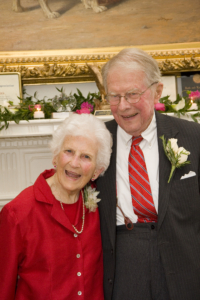Our Founding and History
 If ever an individual understood the importance of focus, it was Lovett C. “Pete” Peters. The intelligence and purpose he brought to his private endeavors accomplished great things. Pete began his career as a security analyst with Bankers Trust in New York City in 1936, and served in Washington, D.C. during World War II as a business executive helping finance the nation’s military aviation industry. After the war, he embarked on a long and successful career in energy, finance, entrepreneurship, and philanthropy.
If ever an individual understood the importance of focus, it was Lovett C. “Pete” Peters. The intelligence and purpose he brought to his private endeavors accomplished great things. Pete began his career as a security analyst with Bankers Trust in New York City in 1936, and served in Washington, D.C. during World War II as a business executive helping finance the nation’s military aviation industry. After the war, he embarked on a long and successful career in energy, finance, entrepreneurship, and philanthropy.
Pete married Ruth Stott during the hurricane of 1938, and the couple remained together for more than 70 years. They returned to Massachusetts in 1966, where Pete served first as president of the Cabot Corporation and later as principal of his own firm, Peters Associates.
The birth of Pioneer Institute
In 1988, Pete and Ruth Peters—as full of youth and energy as ever—refocused their efforts on philanthropy, with an emphasis on education. Inspired by the work of British economist Antony Fisher, who had founded the Institute of Economic Affairs, Pete convinced a core group of leaders that a highly focused, data-driven institute could change conventional wisdoms about public policy in Massachusetts, especially in education.
Pioneer Institute was born.
Pete and Pioneer played a key role in the development of charter schools in the Commonwealth and the remarkable successes that followed passage of the 1993 Massachusetts Education Reform Act. Always a man of ideas and action, Pete in 2000 founded the Save a School Foundation, offering $1 million to school districts willing to convert their worst-performing schools into high performing charter schools.
An enduring legacy
Until well into his 90s, Pete was a fixture on the MBTA, traveling to and from his home in Chestnut Hill. And as Pete Peters endured—modest in manner, true to purpose, and grateful for the blessings and opportunities of being born an American—so too has Pioneer endured.
The Institute is deeply grateful to all of its directors, who over the course of 35 years have helped build the organization with their financial support, commitment to our core principles, and engagement in social entrepreneurship. They have sustained Pioneer even while creating and supporting additional organizations to further our work with school choice, economic opportunity, the life sciences, and immigrant entrepreneurship.
We are especially grateful to our past chairs:
Lovett C. Peters
Colby Hewitt, Jr.
Diane Schmalensee
William B. Tyler
Stephen D. Fantone
